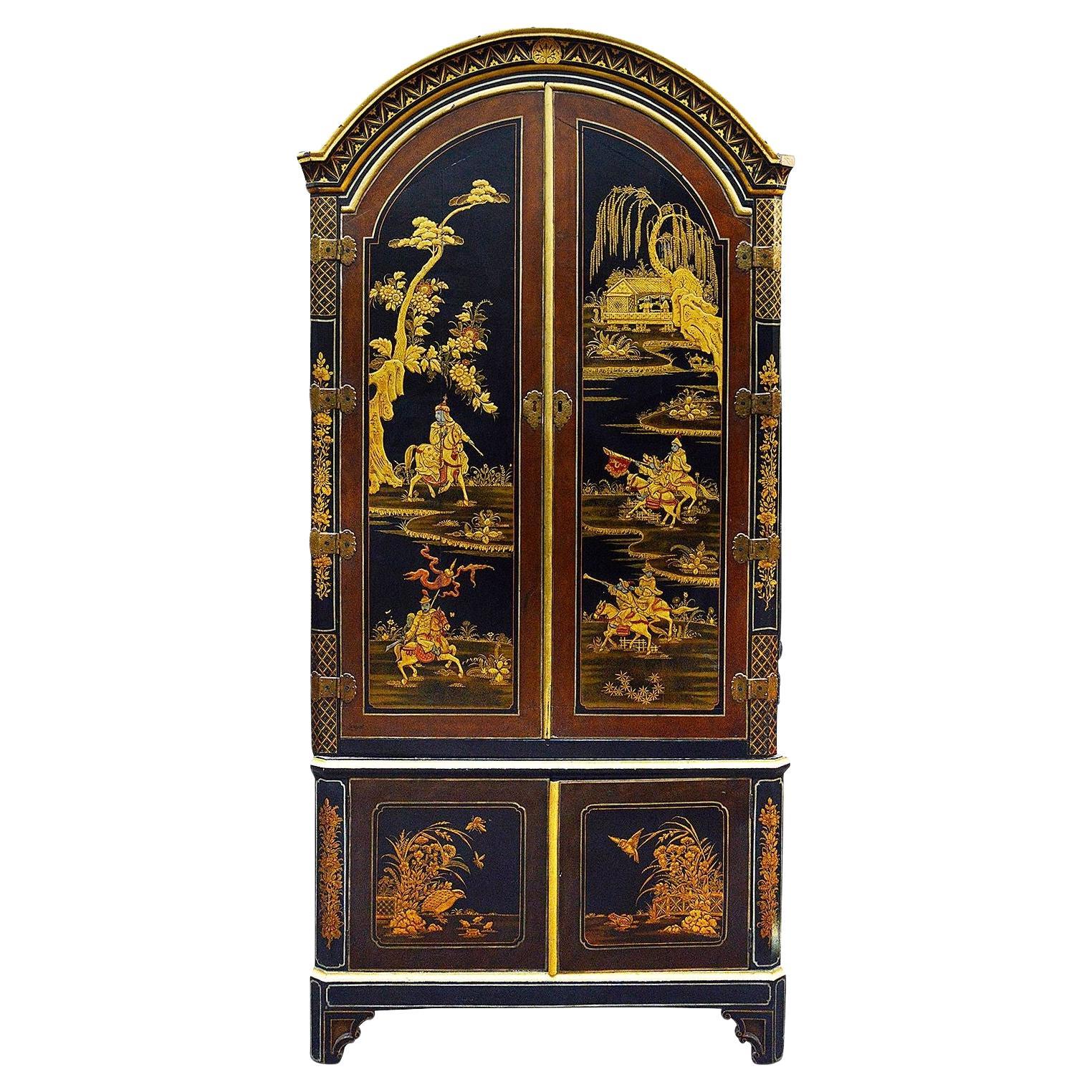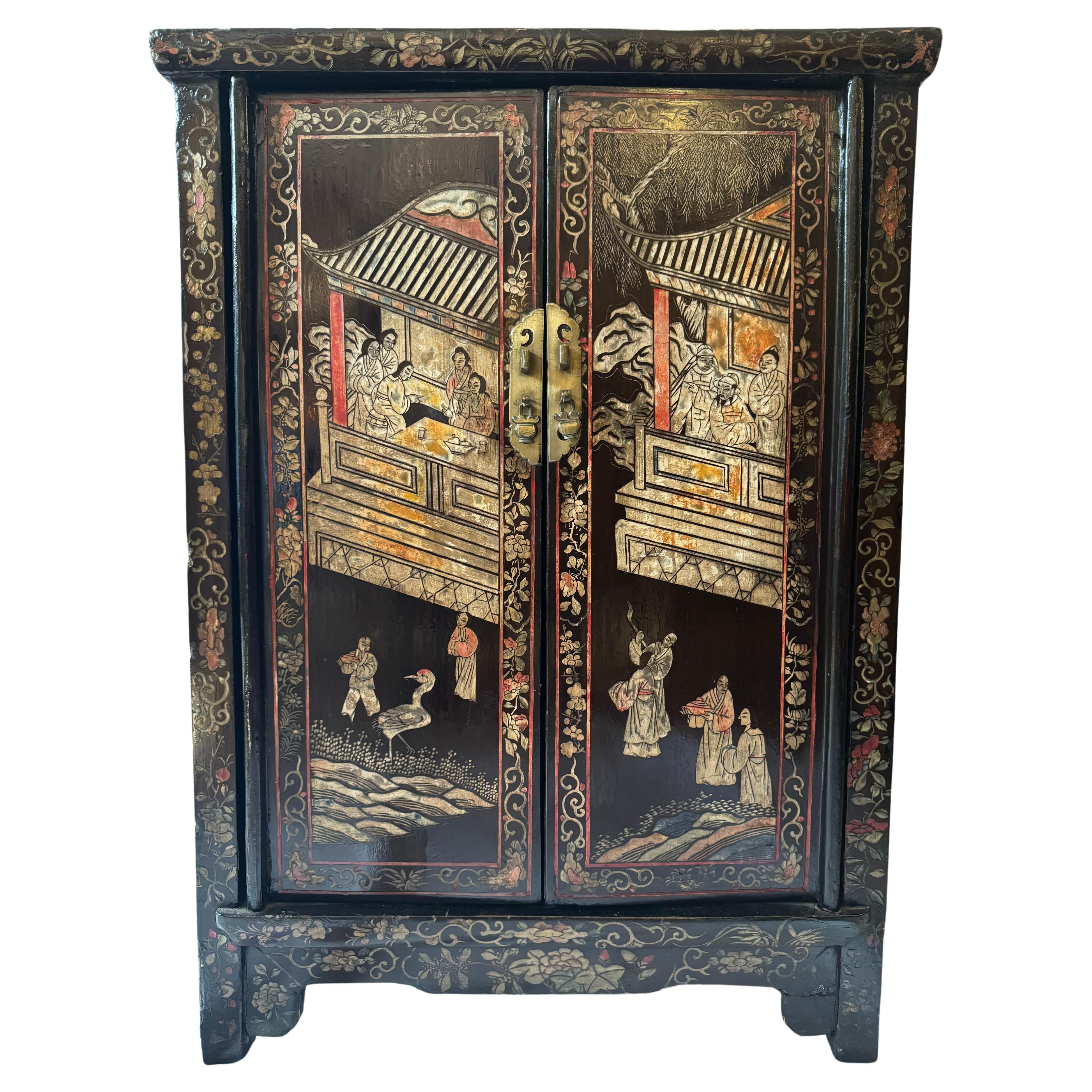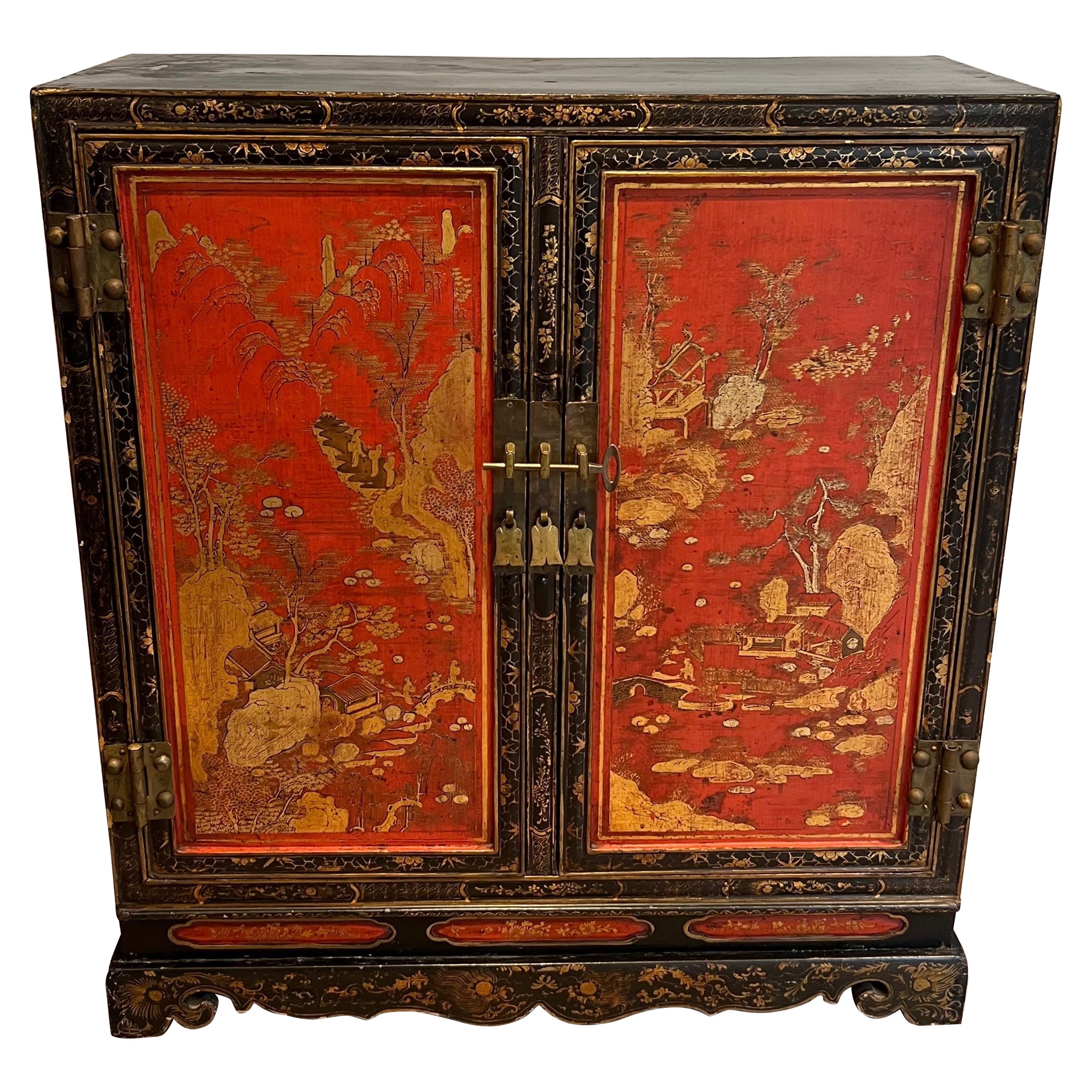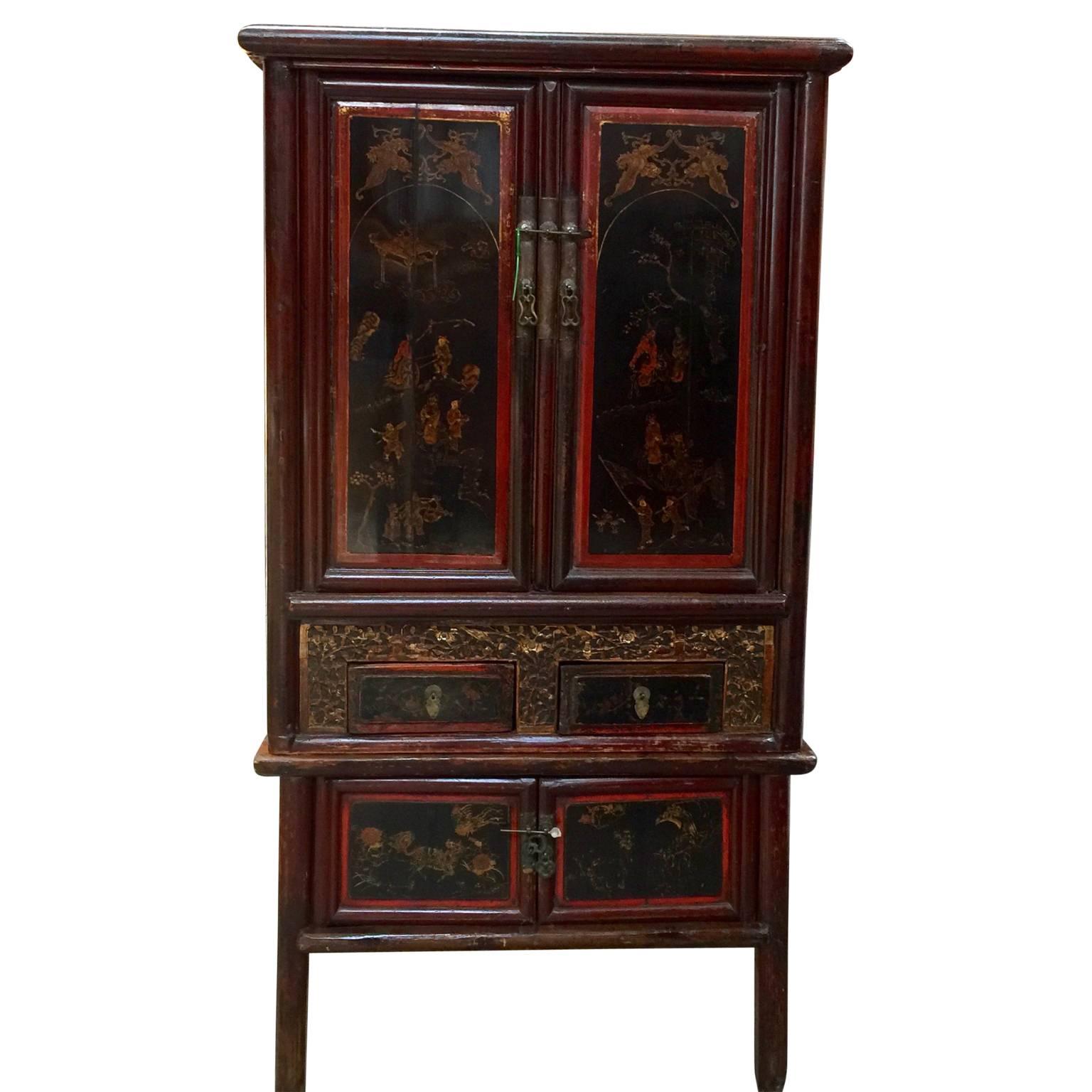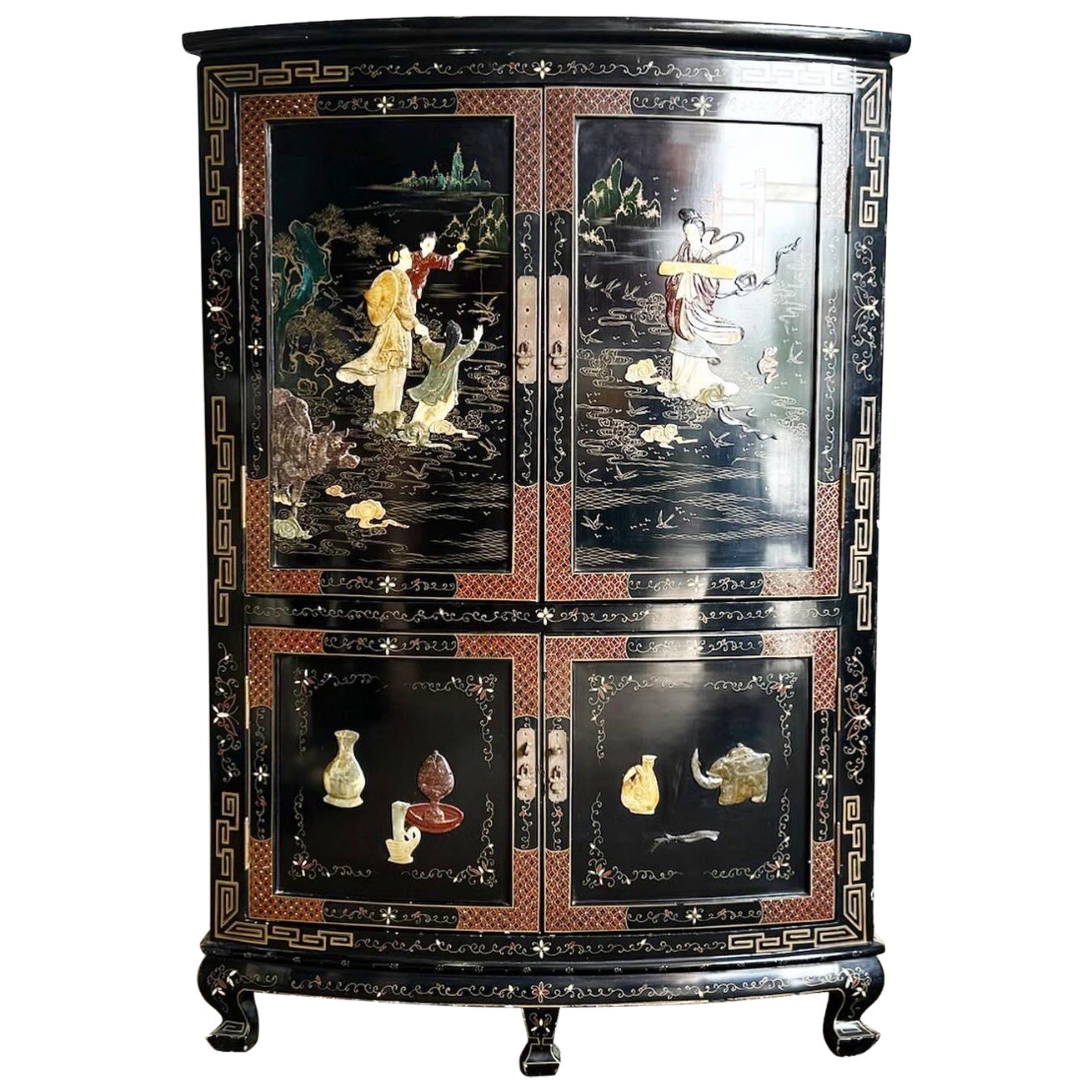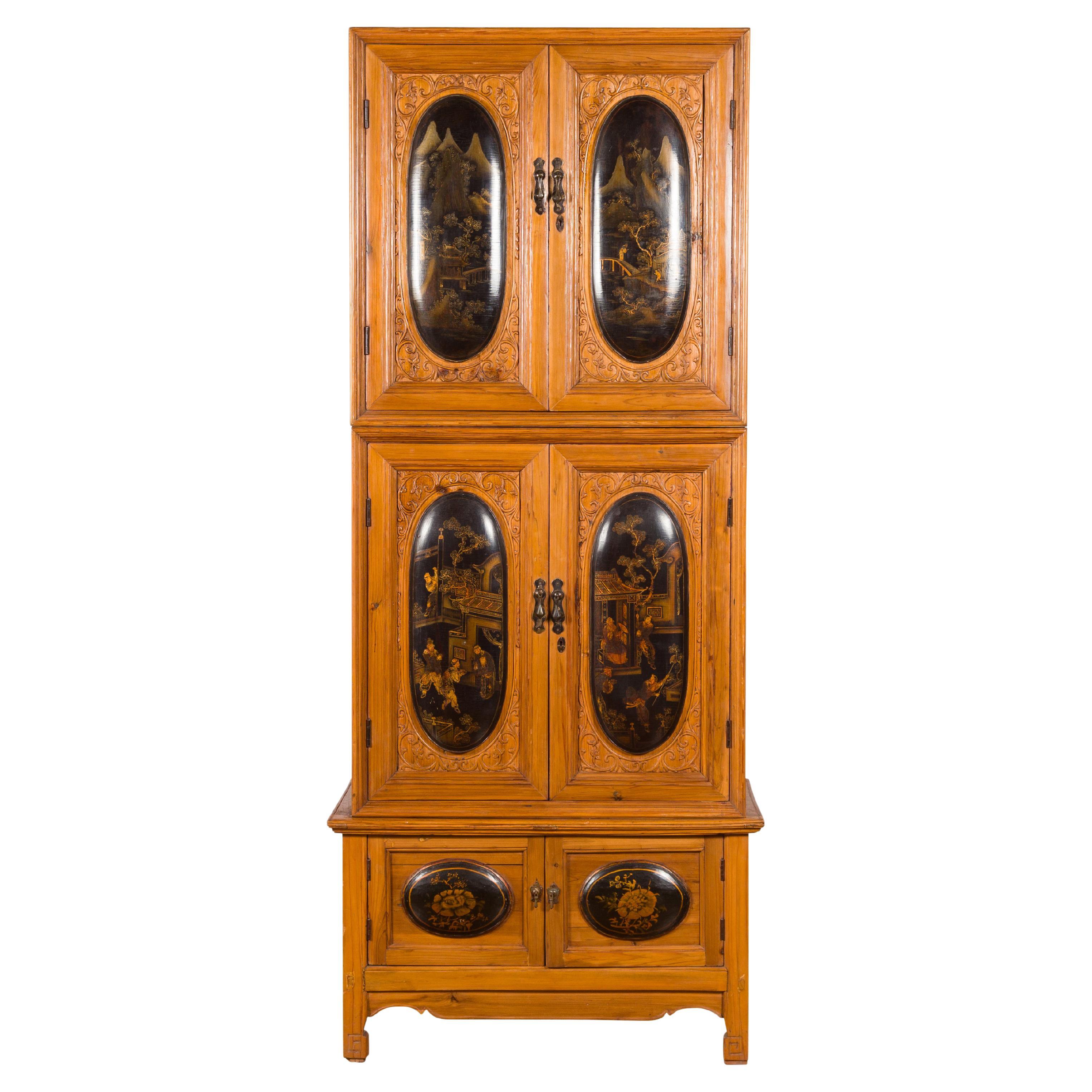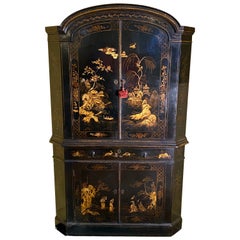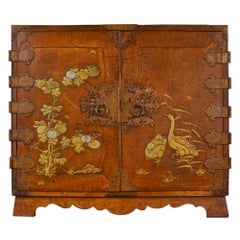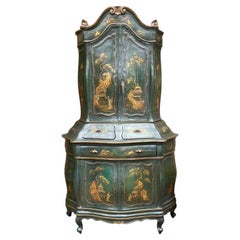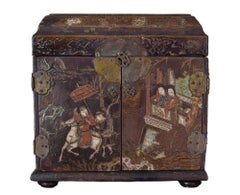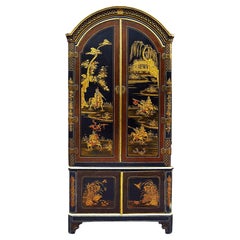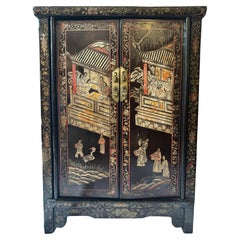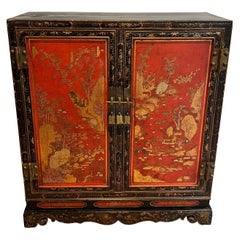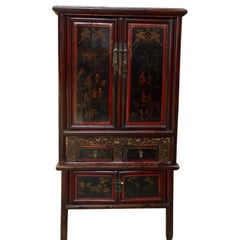Items Similar to Early 18th Century Coromandel Lacquer Corner Cabinet
Video Loading
Want more images or videos?
Request additional images or videos from the seller
1 of 15
Early 18th Century Coromandel Lacquer Corner Cabinet
$11,915.28
£8,880
€10,277.55
CA$16,745.13
A$18,207.95
CHF 9,593.81
MX$221,173.75
NOK 120,613.58
SEK 113,065.49
DKK 77,124.01
About the Item
An early-18th century Coromandel lacquer corner cupboard or cabinet.
This is rare - high quality Coromandel lacquer work (incised decoration) - not to be confused with the usual English japanned versions.
This is also referred to as Bantam work, originating in Bantam, Dutch East Indies, and China, for export to the European market.
The subject matter is of a major pavilion with numerous courtiers - most unusual to see only females - it has been suggested that they may be concubines to a Mandarin.
All of high quality and in the sought-after and refined chinoiserie taste.
In very good unrestored state, retaining vibrant colours and all its original hardware. This is a chic antique, and makes a lovely chinoiserie drinks cabinet, with two fitted shelves.
Ready to use.
Measures:
H: 79 cm (31 1/4’')
W: 57.5 cm (28 1/2’’) max
D: 31.5 cm (12 1/2’')
The fashion icon Coco Chanel had a large collection of Coromandel lacquer items in her Parisian apartments.
References:
Wikipedia-
Coromandel lacquer is a type of Chinese lacquerware, latterly made mainly for export. Referred to as such only in the West because it was shipped to European markets via the Coromandel coast of South-East India, where the Dutch East Indies Company (VOC) and its rivals from a number of European powers had bases in the 18th century.
In 18th-century England Bantamwork signified a particular style of export lacquerware which was cut into a layer of gesso, and then lacquered in colours.
A Technical Study on Chinese Lacquer Technology: Case
UCL - archaeology - events 2018 Dec.
Coromandel lacquer is also known as kuancai and shenke in Chinese. It is a type of polychrome lacquer where designs carved into the smooth lacquer surface were filled with painted colours. The technique has a relatively short manufacturing history and limited written record. Most of its surviving examples are found in European collections.
- Dimensions:Height: 31.11 in (79 cm)Width: 22.64 in (57.5 cm)Depth: 12.41 in (31.5 cm)
- Materials and Techniques:
- Place of Origin:
- Period:
- Date of Manufacture:circa 1700
- Condition:In lovely unrestored state and ready to use.
- Seller Location:Lymington, GB
- Reference Number:Seller: BHA 11791stDibs: LU4081124892782
About the Seller
5.0
Vetted Professional Seller
Every seller passes strict standards for authenticity and reliability
Established in 1957
1stDibs seller since 2018
36 sales on 1stDibs
Typical response time: 11 hours
- ShippingRetrieving quote...Shipping from: Lymington, United Kingdom
- Return Policy
Authenticity Guarantee
In the unlikely event there’s an issue with an item’s authenticity, contact us within 1 year for a full refund. DetailsMoney-Back Guarantee
If your item is not as described, is damaged in transit, or does not arrive, contact us within 7 days for a full refund. Details24-Hour Cancellation
You have a 24-hour grace period in which to reconsider your purchase, with no questions asked.Vetted Professional Sellers
Our world-class sellers must adhere to strict standards for service and quality, maintaining the integrity of our listings.Price-Match Guarantee
If you find that a seller listed the same item for a lower price elsewhere, we’ll match it.Trusted Global Delivery
Our best-in-class carrier network provides specialized shipping options worldwide, including custom delivery.More From This Seller
View AllEarly 18th Century Japanned Double Corner Cabinet
Located in Lymington, GB
A rare chinoiserie standing double corner cabinet, or cupboard.
English, George I-period, ca 1720.
Often erroneously referred to as lacquer work, this is japanned. Beautifully decorated with idyllic scenes of rockwork, pagodas, people, trees, birds, water, with bridges and a boat.
This is a lovely and very useful addition to a room - where corners can present furnishing dilemmas - and this is a chic antique drinks cabinet. These have always been very hard to find, as opposed to the more usual Georgian hanging corner cupboards...
Category
Antique Early 18th Century English George I Cabinets
Materials
Lacquer
Fine and Rare 17th Century Japanese Mulberry Wood Gilt-Lacquer Cabinet on Stand
Located in Lymington, GB
An outstanding and rare, 17th-century Japanese mulberrywood gilt-lacquer cabinet raised on a later stand.
This fine and exceptional two-door, gilt-heightened cabinet - reputedly in mountain mulberry wood...
Category
Antique 17th Century Japanese Cabinets
Materials
Lacquer
19th Century Venetian Rococo Lacquer Cabinet
Located in Lymington, GB
An antique Venetian rococo japanned (or 'lacquer') cabinet.
This rare and sophisticated antique cabinet separates in two, with bombé and serpentine profiles.
The particularly fine ...
Category
Antique Mid-18th Century Italian Rococo Cabinets
Materials
Lacquer
$8,050 Sale Price
53% Off
Rare Chinese Kangxi Polychrome Coromandel Lacquer Casket
Located in Lymington, GB
A rare Chinese polychrome Coromandel or ‘Bantam Ware’ lacquer casket or table cabinet, Kangxi period (1661-1722). Circa 1700.
This fine small Chinese-export lacquer fitted casket is decorated overall with polychrome incised decoration. Opening with two doors revealing a red interior with fitted drawers and a hinged rising top. In superb, almost entirely original condition, retaining its vivid colours and fine details with courtiers in a pavilion and on horseback amidst foliage and formal palace gardens. The small bun-type feet are historical replacements. Interestingly bearing an antique-script inventory #25 and A I on the base.
Nb. Bantamwork or Coromandel lacquer, not to be confused with ‘japanning’, is the term applied to decoration that is cut into a layer of gesso and then lacquered in colours. Much of the lacquer was transhipped from China through Coromandel in India, or the Dutch colony Batavia, Java.
References:
Coromandel lacquer or 'Bantamwork', with its characteristic incised decoration, was made in Henan province in Northern China from the latter-part of the Ming dynasty and exported to Europe from the end of the 17th Century through the East India Company's and VOC trading posts on the Coromandel Coast of India. The technique consisted in overlaying a base of wood with a series of increasingly fine white clays and fibrous grasses. Over this surface, lacquer was applied and polished before the design was incised and the hollowed out portions filled with colour and gilt and finished with a clear lacquer to protect it.
Although John Stalker and George Parker used the term 'Bantamwork', the contemporary layman usually called it 'cutt-work', 'cutt Japan' or 'hollow burnt Japan'. Stalker and Parker discuss two types of 'Bantam-work' - flat and incised - in their 'Treatise on Japanning and Varnishing' (1688), noting that it 'was done in colors mix't with a gum water'. They also considered that it was 'almost obsolete, and out of fashion, out of use and neglected....' although admitted that 'it was very pretty, and some are more fond of it, and prefer it to the other...'.
This casket/ table cabinet now on offer is related to one formerly with Malletts and illustrated in A. Bowett, 'English Furniture 1660-1714: From Charles II to Queen Anne' (2002) p. 150, plates 5:9.
A much larger yet closely-related Bantam work coffer with rising lid was offered in the 'Asian Art in Cologne' sale lot 114 on 11th December 2021. Estimated @ £ 60,000 - £79,000.
Mme de Pompadour, mistress to King Louis XV from 1745 to 1751, was an avid collector and admirer of Chinese Coromandel or Bantam Work, and was probably largely responsible for the very high prices recorded for such pieces, sometimes 10 times or more the price of ordinary furniture of equivalent quality.
A Coromandel cabinet...
Category
Antique 18th Century Chinese Cabinets
Materials
Lacquer
Early-18th Century Red Japanned Corner Cabinet Cupboard
Located in Lymington, GB
An English early-eighteenth century red japanned bow-front corner cupboard, or cabinet, George II-period, circa 1730.
In superb condition throughout.
Retaining its original butterfly hinges, with a period key and working lock.
These are usually encountered with a black background, however when in red these examples of japanning are much sought after. Many were produced domestically, often by talented female members of the family.
Note the charming English interpretations in the decorated surfaces.
An unusual subject can be seen in the base, a hunter on horseback with sword drawn, confronting a mythological beast, probably representing a tiger with mandarins posing amongst stylised pagodas, rooftops and rockwork.
Chinoiserie-decorated surfaces were extremely popular in the early part of the 18th century, almost reaching a craze among the upper classes wishing to demonstrate their fashionable status. There were several revivals of chinoiserie particularly in the first quarter of the 20th century, so caution is advised in one’s collecting. This type of decoration is also sometimes erroneously referred to as ''lacquer’'.
The fashion icon Coco Chanel furnished her exquisite Paris apartments largely in the European chinoiserie taste.
References:
V & A – The development of English black japanning 1620-1820, A History of Japanning in England: Technique & Decoration.
John Stalker and George Parker...
Category
Antique 18th Century English George II Corner Cupboards
Materials
Lacquer
Rare Queen Anne Chinoiserie Japanned Chest On Stand
Located in Lymington, GB
A sophisticated Queen Anne-period chinoiserie japanned chest raised on elegant cabriole legs with 'pony foot' carved detailing.
This early-18th century chest on stand demonstrates the charming and highly fashionable English domestic interpretation of oriental scenes of pagodas, rockwork, trees, ornamental bridges, mythical birds, and figures dressed in the oriental manner, holding parasols and cavorting in gardens. All in remarkable condition having survived some three hundred years. Chests on cabriole supports of this form were also very much in fashion in the American colonies during this early Queen Anne-period (1702-1714). Sometimes erroneously referred to as ‘'lacquer''.
The fashion icon Coco Chanel furnished her exquisite Paris apartments largely in the European chinoiserie taste.
References:
V & A Museum, London - The development of English black japanning 1620-1820.
Literature and further reading:
John Stalker and George Parker...
Category
Antique 18th Century English Queen Anne Commodes and Chests of Drawers
Materials
Lacquer
You May Also Like
19th Century Chinoiserie lacquer corner cabinet.
Located in Brighton, Sussex
A very imposing 19th Century Black lacquer Chinoiserie corner cabinet. Having classical hand painted scenes of warriors on horse...
Category
Antique 19th Century English Chinoiserie Corner Cupboards
Materials
Lacquer
19th Century Chinoiserie Lacquer Side Cabinet
Located in CABA, AR
This 19th-century Chinese Chinoiserie lacquer side cabinet is a splendid testament to the enduring allure of the Chinoiserie movement that swept through Europe in the 17th century. A...
Category
Antique 19th Century Chinoiserie Furniture
Materials
Wood, Lacquer
$4,000 Sale Price
20% Off
Lacquered Wood Cabinet with Chinese Seenes
Located in Marcq-en-Barœul, Hauts-de-France
This beautiful two doors cabinet is made of black and red lacquered wood presenting Chinese sceens and decorations in gold tones. This is a French work. Circa 1940
Category
Vintage 1940s French Chinese Export Cabinets
Materials
Brass, Bronze
$5,108 Sale Price
26% Off
Early 20th Century Chinese Cabinet
Located in Copenhagen, K
Beautiful Chinese cabinet in mainly black and red lacquer with red decorations. Contains several shelves and four drawers, all with original brass hardware.
Category
Antique Early 1900s Chinese Chinoiserie Cabinets
Materials
Wood
$3,880 Sale Price
20% Off
Chinese Black Lacquered and Hand Painted Demi Lune Cabinet
Located in Delray Beach, FL
Discover the elegance of traditional Chinese craftsmanship with the Chinese Black Lacquered and Hand Painted Demi Lune Cabinet. Its elegant demi lune shape, enhanced with a rich blac...
Category
Vintage 1980s Chinese Cabinets
Materials
Wood
$636 Sale Price
20% Off
Tall Wood Cabinet with Chinoiserie Lacquer Panels and Carved Foliage Details
Located in Yonkers, NY
A tall Chinese cabinet with carved chinoiserie panels and richly patinated wood. Composed of three distinct tiers, this substantial storage piece features a vertical stack of doors—t...
Category
20th Century Chinese Cabinets
Materials
Wood
More Ways To Browse
Voc Antique
Antique Coromandel
Coromandel Furniture
Brown Coromandel
Painted Corner Cabinet 18th Century
Dutch Voc
18th Century Lacquer Cabinets
Antique 18th Century Corner Cupboard
Holland And Company
Antique Drinks Cabinets
18th Century Dutch Painted Cabinet
Coromandel Cabinet
Japanned Corner Cabinet 18th Century
Chinese Lacquerware
Coromandel Lacquer Cabinet
Chinoiserie Drinks Cabinet
Vintage Antique Cabinets
Brass China Cabinet
